Civilization VI’s first expansion, Rise and Fall, has been revealed. Given that – in contrast to its predecessor – Civ VI launched with many of the series’ key features already in place, we’ve been especially curious to see where its first major expansion would take us, and we got the chance to go into more depth about the thinking behind its new direction with lead designer, Anton Strenger.
Here’s everything we know about Civ 6: Rise and Fall.

PCGamesN: It sounds like Historic Moments are the new way to trigger Golden Ages. Can you give a couple of examples of these?
Anton Strenger: There are over 100 historic moments in the game that cover a broad range of playstyles. These include circumnavigating the world for the first time, or founding a new religion. There are major moments – the particularly cool ones that will show up in your timeline with a unique illustration – as well as smaller, but still significant, moments. Think of it like an achievement system.
How will they contribute to a Golden Age?
AS: Historic Moments award Era Score, and this is what determines what Age you will fall into as the era transitions. Reaching a certain threshold will trigger a Golden Age, but failing to do so will trigger a Dark Age. After receiving a Golden Age, the threshold is changed, and the next one is harder to achieve. But after receiving a Dark Age, the threshold is changed to make it a bit easier to get a Golden Age next time.
How do Golden, Heroic, and Dark Ages each affect your civ?
AS: All the Ages allow the player to make a Dedication – a sort of strategic direction you choose for your civ to follow in the new game era. For Dark and Normal Ages, this Dedication opens up an additional source of Era Score that you can use to earn a better Age in the future.
For example, a Religious Dedication could award Era Score each time you convert a city to your religion. For Golden Ages, this Dedication will instead provide a powerful bonus in that gameplay area. A Religious Dedication in a Golden Age gives extra movement and conversion charges to all your religious units, letting you make a power play to spread your religion, and perhaps even push an early Religion Victory.
Heroic Ages get the same powerful Dedication bonuses as Golden Ages, but the difference is that you get to pick three, rather than just one.
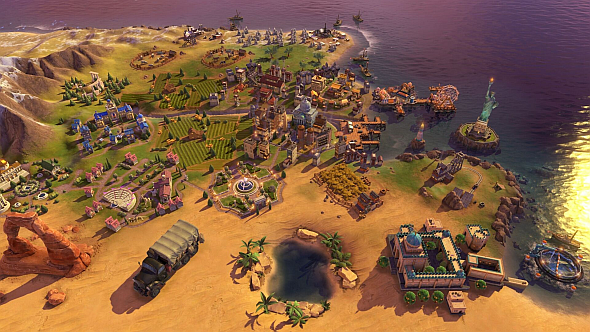
Are there any advantages to deliberately entering a Dark Age, either for its own merits or for a chance at a Heroic Age?
AS: We do have some people in the office who favour the strategy of zig-zagging between Dark Ages and Heroic Ages, rather than simply riding a wave of Golden Ages, and I am interested to see how the community responds, too. Some of the Dark Age Policies for your Wildcard government slots are particularly powerful, and there is definitely some benefit to taking the losses to get an advantage in a particular type of gameplay.
Can we expect some of the new civs to have unique bonuses relating to Great Ages, like Darius in Civ V?
AS: Absolutely. There is one leader in particular that I’m thinking of, though I can’t tell you who exactly, and she plays with the Ages system in a very interesting way.
What are the challenges of a Dark Age? Do they take the form of gameplay objectives?
AS: The Dedications I mentioned are a bit like objectives, yes, but they are things that will help you. Choosing a Military Dedication in a Dark Age, for example, could mean that you get Era Score each time you defeat an enemy unit. This makes it easier to work towards a better Age in the next game era, since you don’t have to rely solely upon Historic Moments. But Dark Ages also carry a challenge with them.
During a Dark Age, the Loyalty of all your cities is decreased below normal, making them vulnerable to rebellion. You’ll need to use Governors and other Loyalty sources carefully to keep your empire intact, and may even lose a city or two if you have a particularly sprawling empire. With the Dark Age Policies and the potential to rise into a Heroic Age, however, it is well worth the risk!
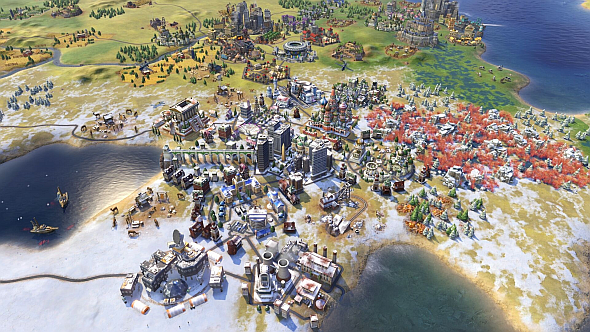
Speaking of which, tell us about Governors – are they simply assigned to cities, or do they exist as units on the world map?
AS: Governors are assigned to cities, yes. Though they do not exist on the world map, our art team lead had a big hand in the visual design of these Governors, and really brought them to life as individual, unique characters with personalities that match their gameplay.
How will players unlock and upgrade Governors?
AS: Governor Titles are unlocked through the Civics tree, primarily. Each time a Title is earned, it may be spent either recruiting a new Governor, or promoting an existing Governor. There’s a really interesting choice here of whether to have a lot of slightly promoted Governors throughout a wide empire, or some very powerfully promoted Governors in just a few cities.
How many types of Governor are there, and what benefits do they confer?
AS: There are seven different types of Governors, each covering a set of gameplay functions. For example, Liang the Surveyor allows builders extra charges. Going further down her promotion tree, there’s the ability to unlock unique Improvements – the City Park and Fishery – that you cannot build in the game any other way. One of my favourite Governor promotions is for the Financier, and allows you to outright purchase city districts with gold.
Are any Governors inspired by historical figures, as with Great People?
AS: They’re inspired by historical archetypes more than specific people. Throughout history, there have been leaders that had different focuses or strategies to achieving their goals, and that was what inspired their playstyles and personalities.
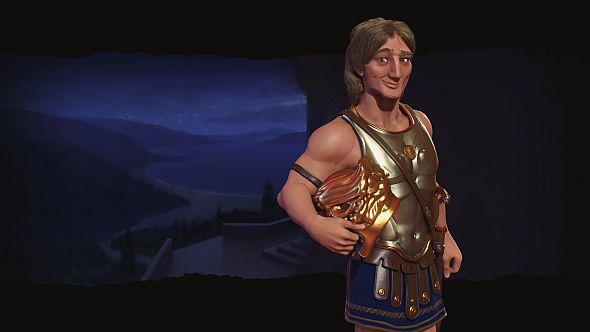
How can we gain or lose a city’s Loyalty?
AS: Loyalty is tied into other systems like Amenities, but it’s also influenced by geographic location. When I played Civilization VI, I would often forward settle other players, but now that’s going to be a tougher choice. I can block their progress, but settling a city that close to another empire, and far from my own, is going to prove a Loyalty issue. Governors play an active role in increasing Loyalty, though, as you can establish them in cities to increase the Loyalty of that particular city, or create an area of effect in certain cases.
Are there any diplomatic repercussions to causing a rival city to defect to your civ?
AS: Not currently. Because all cities that rebel become a Free City, cities will never defect directly from one civ to another, and it’s less clear who would be to blame for that city’s independence in the first place. That said, tweaks like this are something we are actively balancing and investigating.
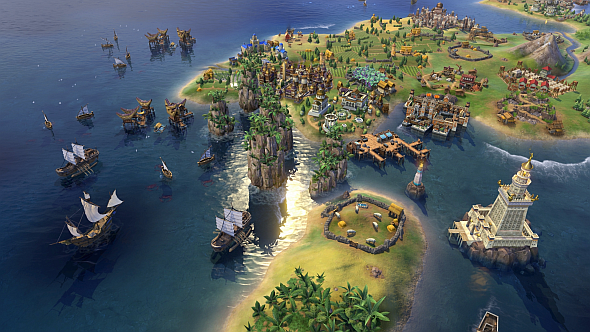
How will emergencies work?
AS: Emergencies exist as a way for all the civs to respond collectively to certain major moments that could threaten the world – for example, the launch of a nuke, or the conversion of a religion’s holy city. When an Emergency is triggered, civilisations in the world are offered a choice on whether or not to join a pact. If they choose to join, they are given a goal, and an advantage to achieving it. In the case of the nuclear city, they get a combat bonus against the offending civ, and the goal to capture some cities from them.
What rewards might an Emergency confer upon players who complete it, or on targeted players who survive it?
AS: Rewards vary based on the type of Emergency, but some range from combat bonuses against civs in the emergency to increased gold from trade routes. These effects last for the rest of the game, so it’s important to consider the potential outcomes of an emergency quite carefully before joining.
We hear there are several types of Enhanced Alliance, with bonuses that will strengthen over time – could you give some examples?
AS: There are now different Alliance types: Military, Research, Cultural, Religious, and Economic. For the amount of time spent in a given alliance, its effects are increased. For example, in a level one Research Alliance, both allies receive Science bonuses to their Trade Routes. At level two, they still receive their Science bonuses, but also get a Tech Boost at regular intervals. Level three is all of the above, plus bonus Science when researching the same technology, or a technology your ally had already researched.
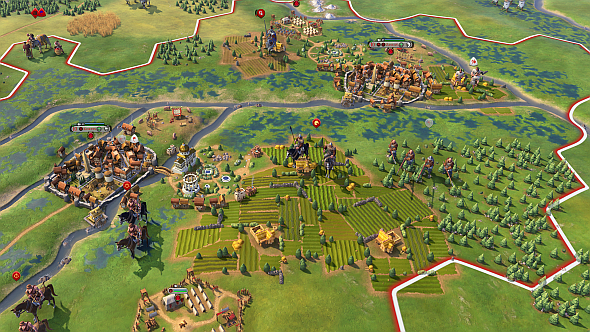
The key feature of endgame diplomacy has traditionally been the World Congress, which isn’t in Rise and Fall – are Emergencies and Enhanced Alliances an attempt to move beyond it?
AS: The Emergencies are somewhat inspired by the World Congress, in that it gives civilisations that may otherwise choose to act independently an opportunity to work together towards a common goal. But as we move forward with the Civilization franchise, we’re always looking for ways to explore new and fresh ideas, as well as new takes on favourite systems from previous games.
In that Emergencies have different triggers, and can confer bonuses on players who survive them, they seem like a way to challenge leading civs without being as simple as a numerical rubber-banding mechanic. What was the thinking behind this design?
AS: That actually speaks to a more general design approach that has been with us through the whole expansion. As a designer, I like the /situations/ that rubber-banding mechanics create, because in a long game like Civilization, it can create tension and drama all the way to the conclusion by keeping competitors nipping at your heels. But I rarely like rubber-banding mechanics /themselves/. They feel frustrating on a very fundamental level, because they cheapen the success and progress you make as the game tries to catch everyone else up.
So the systems we are adding with this expansion, from the Emergencies to the Golden Ages and Dark Ages, do have the potential to cause drama and challenge for players in the lead, and give opportunities for players who are behind to catch up. But they are not rubber bands that will artificially skew play. We are adding these systems in a transparent and fair way, which strategic players will be able to play to their advantage.
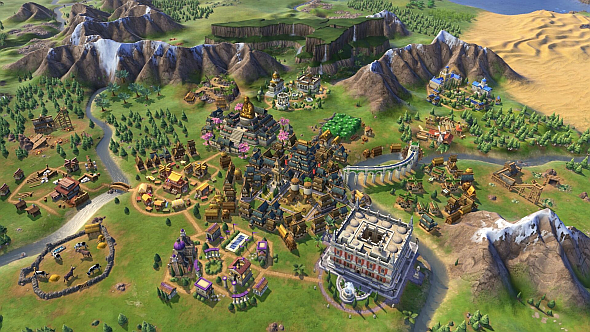
Looking beyond the expansion to general game health, what is your assessment of the AI right now? What if anything do you think needs improving, and do you have plans to do so?
AS: We have put out a lot of patches over the last year to address AI behaviour, and we are continuing to play and monitor how they make decisions and where they are weighing different options inappropriately. I feel good about the trajectory, and where the AI is right now, especially with the new systems – our AI engineer has been working in stride with us to ensure that the AI players understand and utilise the new systems in competitive ways. For example, it understands the new Loyalty mechanics and places its cities intelligently. Whereas in the base game the AI would sometimes settle aggressively near your own cities, it now understands the Loyalty risk in doing so, and will plan accordingly.
With regard to your bug fixing processes, it can be a while between patches. Is this something you feel you could improve? Do you have any plans to move toward a hotfixing process?
AS: We are always working on improvements to the game here in the studio, even if we cannot get them into the hands of our fans right away. Hotfixes are definitely a powerful tool, but they are not always the right decision. Each time we release an update we want it to be complete and stable. Releasing smaller updates more frequently can have advantages, but also runs a higher risk of causing an unexpected bug or game balance issue. We are always investigating the best ways to keep our game moving forward, and actively watch fan forums and feedback to inform our next moves.
Anton Strenger joined Firaxis in 2011 as a designer on Civ V’s Gods & Kings expansion. He designed the World Congress in its next expansion, Brave New World, before moving on to sci-fi spin-off Beyond Earth and its Rising Tide expansion. He is now taking the lead on Civ VI: Rise and Fall.
